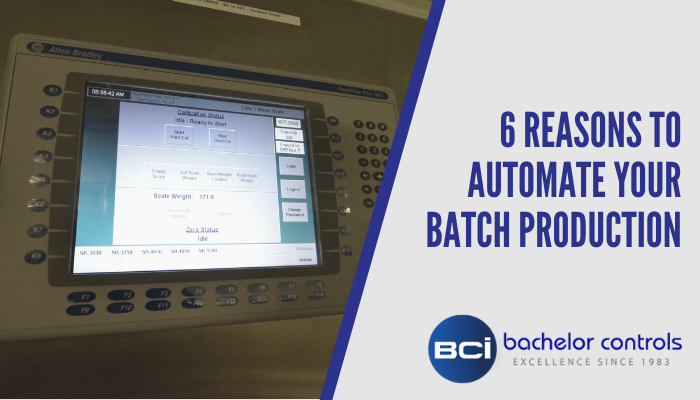
While automating batch production is more demanding than automating continuous processes, it can also be tremendously beneficial to your productivity and your bottom line. If you’re considering automating your current batch production processes, here are the six reasons you should do so now.
REDUCED STRAIN ON LABOR
Automation reduces the amount of manual labor needed to produce quality products. In doing so, it can reduce the amount of production-related workplace injuries and improve overall workplace safety. This is especially important if you have an aging workforce.
GREATER THROUGHPUT AND CONSISTENCY
Automation can also help you eliminate operator delays and deliver materials at a higher rate while consuming less energy overall. By automating your batch processes, you can achieve more consistency and greater quality of finished products.
IMPROVED PRODUCTION ACCURACY
Automating your batch production allows you to minimize waste, in large part, by allowing you to leverage your manufacturing execution systems (MES) and other performance analysis tools that help you optimize your processes. Using these tools can help you manage ingredient delivery more effectively, achieve precise target weights of ingredients or food/beverage products and materials, and monitor variations in weight as well.
BETTER INGREDIENT AND RECIPE MANAGEMENT
Automated systems typically include databases for ingredients that allow you to manage recipes, preact values, and locations more effectively. By linking these systems to your ERP, you can configure them to reorder certain ingredients when your stock hits certain levels automatically.
These systems also allow you to track the recipe, ingredients, and parameters used in each batch. You can easily monitor variance between established target setpoints and actual batch outputs for each batch, as well as keep track of your original recipe and all changes made to it via recipe version control.
GREATER QUALITY CONTROL
By aligning your batch processes with your MES, you can not only track everything from waste to uptime, but you can also exercise greater quality control through lot tracking, the use of barcoding, and strategic production scheduling. Doing so can not only help you ensure you’re producing quality products but also help you remain in compliance with the Food Safety Modernization Act and relevant FDA regulations.
By feeding batch data into your MES, you’ll better be able to pinpoint variables like ingredient expiration periods and better differentiate between batches containing allergens, GMOs, and glutens and those they do not. Automation allows for better ingredient sequencing during batch processing than you can achieve solely through batch processing alone and can help you handle your materials better throughout the entire production process.
IMPROVED OPERATIONAL AWARENESS
By feeding data from your newly automated batch production processes into your MES and other systems, you can monitor your KPIs more effectively. These systems can also help you recognize problems (from inventory shortfalls to scheduling issues) early, and assess production problems after they’ve occurred to avoid reoccurrence.
Looking for more information or looking to get started automating your batch production? Let us at BCI help you improve your plant performance using our first-class MES, the BCI CORE Batching Suite, and production solutions tailored specifically to your operational parameters. Contact us today to get started.



